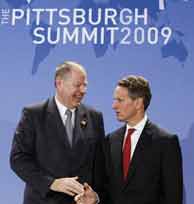This is the VOA Special English Economics Report.
Last week's meeting in Pittsburgh, Pennsylvania, was the third Group of 20 summit in less than a year. Leaders of the major developed and developing economies discussed ways to fix the world financial system.
In April they had agreed to do everything necessary to prevent a collapse. This time they noted their success, but warned that the "process of recovery and repair remains incomplete."

The presidents and prime ministers launched what they called a Framework for Strong, Sustainable and Balanced Growth. At the same time, they agreed to make the G20 the main group -- the "premier forum" -- to guide international economic cooperation.
For years that has been a job for the Group of 8: Britain, Canada, France, Germany, Italy, Japan, Russia and the United States. But the G8 leaves out developing nations with big populations and growing economies like China, India and Brazil.
In Pittsburgh, rich nations agreed to also give up some of their representation in the International Monetary Fund. And they called for more voting power for developing nations in the World Bank.
Ghiyath Nakshbendi is a professor of international business at American University in Washington. He says the decision to cooperate on economic policy is important given how much Gross Domestic Product the G20 represents.
GHIYATH NAKSHBENDI: "They are going to work together in order to achieve the goals of the world -- that really, when you talk about the G20, you are talking about 19 countries plus the E.U. that produce 95 percent of the G.D.P. in the world."
Martin Edwards is an assistant professor at Seton Hall University in New Jersey who has written about the I.M.F. He says increasing the influence of developing nations will increase the standing of the fund and the World Bank. But he notes that having more players at the table could also mean more disputes.
In terms of financial reforms, experts say there is widespread support for some proposals to control risks. But others are unpopular in America and Britain. These include linking the pay of bankers to their bank's long-term performance.
G20 leaders plan to meet next in Canada in June and in South Korea next November. They face many hard choices in the coming months. Professor Nakshbendi says the biggest question is to what extent are they willing to follow their own advice.
And that's the VOA Special English Economics Report, written by Mario Ritter. I'm Steve Ember.
Related stories:
G20峰会贝卢斯科尼欲抱米歇尔遭拒
World powers step up pressure on Iran
G20 leaders talk about economy -- and Iran
G20 leaders wrap up their economic summit
(Source: VOA 英语点津编辑)